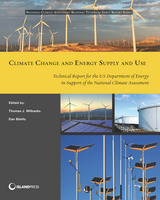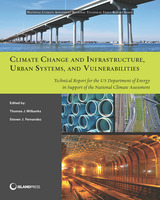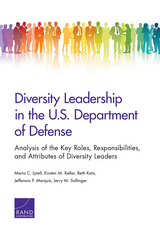4 books about U . S Department

Climate Change and Energy Supply and Use
Technical Report for the U.S. Department of Energy in Support of the National Climate Assessment
Thomas J. Wilbanks
Island Press, 2014
Developed to inform the 3rd National Climate Assessment, and a landmark study in terms of its breadth and depth of coverage and conducted under the auspices of the U.S. Department of Energy, Climate Change and Energy Supply and Use examines the known effects and relationships of climate change variables on energy production and supply, including oil, gas, thermal electricity, and renewable energy.
Knowledge of today’s available energy forms is constantly surfacing and changing in the face of climate change, making it increasingly important to enhance communication about various energy supplies. This report on energy supply and use summarizes current knowledge, especially emerging findings, about implications of climate change for energy production and supply (oil and gas, thermal electricity, renewable energy, integrated perspectives, and indirect impacts on energy systems). A comprehensive resource for community planners and researchers, it discusses future risk-management strategies surrounding water treatment, heating or cooling, and mitigation that the country can utilize in its energy consumption. The authors analyze findings from their own research and practice to arrive at conclusions about vulnerabilities, risks, and impact concerns for different aspects of U.S. energy supply and use. Global and national policy contexts are informed by these efforts to create energy options and choices.
Rich in science and case studies, Climate Change and Energy Supply and Use offers decision makers and stakeholders a substantial basis from which to make informed choices that will affect energy risk-management in the decades to come.
Knowledge of today’s available energy forms is constantly surfacing and changing in the face of climate change, making it increasingly important to enhance communication about various energy supplies. This report on energy supply and use summarizes current knowledge, especially emerging findings, about implications of climate change for energy production and supply (oil and gas, thermal electricity, renewable energy, integrated perspectives, and indirect impacts on energy systems). A comprehensive resource for community planners and researchers, it discusses future risk-management strategies surrounding water treatment, heating or cooling, and mitigation that the country can utilize in its energy consumption. The authors analyze findings from their own research and practice to arrive at conclusions about vulnerabilities, risks, and impact concerns for different aspects of U.S. energy supply and use. Global and national policy contexts are informed by these efforts to create energy options and choices.
Rich in science and case studies, Climate Change and Energy Supply and Use offers decision makers and stakeholders a substantial basis from which to make informed choices that will affect energy risk-management in the decades to come.
[more]

Climate Change and Infrastructure, Urban Systems, and Vulnerabilities
Technical Report for the U.S. Department of Energy in Support of the National Climate Assessment
Thomas J. Wilbanks and Steven Fernandez
Island Press, 2014
Hurricane Irene ruptured a Baltimore sewer main, resulting in 100 million gallons of raw sewage flooding the local watershed. Levee failures during Hurricane Katrina resulted in massive flooding which did not recede for months. With temperatures becoming more extreme, and storms increasing in magnitude, American infrastructure and risk-management policies require close examination in order to decrease the damage wrought by natural disasters. Climate Change and Infrastructure, Urban Systems, and Vulnerabilities addresses these needs by examining how climate change affects urban buildings and communities, and determining which regions are the most vulnerable to environmental disaster. It looks at key elements of urban systems, including transportation, communication, drainage, and energy, in order to better understand the damages caused by climate change and extreme weather. How can urban systems become more resilient? How can citizens protect their cities from damage, and more easily rebound from destructive storms? This report not only breaks new ground as a component of climate change vulnerability and impact assessments but also highlights critical research gaps in the material. Implications of climate change are examined by assessing historical experience as well as simulating future conditions.
Developed to inform the 3rd National Climate Assessment, and a landmark study in terms of its breadth and depth of coverage and conducted under the auspices of the U.S. Department of Energy, Climate Change and Infrastructure, Urban Systems, and Vulnerabilities examines the known effects and relationships of climate change variables on American infrastructure and risk-management policies. Its rich science and case studies will enable policymakers, urban planners, and stakeholders to develop a long-term, self-sustained assessment capacity and more effective risk-management strategies.
Developed to inform the 3rd National Climate Assessment, and a landmark study in terms of its breadth and depth of coverage and conducted under the auspices of the U.S. Department of Energy, Climate Change and Infrastructure, Urban Systems, and Vulnerabilities examines the known effects and relationships of climate change variables on American infrastructure and risk-management policies. Its rich science and case studies will enable policymakers, urban planners, and stakeholders to develop a long-term, self-sustained assessment capacity and more effective risk-management strategies.
[more]

Diversity Leadership in the U.S. Department of Defense
Analysis of the Key Roles, Responsibilities, and Attributes of Diversity Leaders
Maria C. Lytell
RAND Corporation, 2016
This study identifies the knowledge, skills, abilities, and other personal characteristics needed in individuals who will be responsible for implementing strategic diversity plans in the Department of Defense (DoD). The authors interviewed more than 60 diversity leaders in industry, the public sector (including DoD), and academia and reviewed relevant scientific literature, education programs, and advertised job requirements.
[more]

Museum Diplomacy
Transnational Public History and the U.S. Department of State
Richard J. W. Harker
University of Massachusetts Press, 2020
The Museums Connect program stands at the intersection of transnational public history and international diplomacy. Sponsored by the U.S. Department of State and administered by the American Alliance of Museums, this program partners U.S. museums and non-U.S. museums in projects designed to foster community collaboration and engagement. Museum Diplomacy focuses on three Museums Connect projects arranged between the United States and South Africa, Morocco, and Afghanistan, respectively. Utilizing a diverse range of oral interviews, Richard J. W. Harker explores how museums negotiate national boundaries, institutional and local histories, and post-9/11 geopolitical interests. Working in different political and professional contexts, museum partners have built community-driven collaborative exhibitions and projects that tell transnational stories.
As more historic sites and museums seek to surmount social, cultural, and economic barriers between themselves and their communities in their exhibitions and programming, the Museums Connect program provides important lessons on how to overcome entrenched hierarchies of power in public history.
As more historic sites and museums seek to surmount social, cultural, and economic barriers between themselves and their communities in their exhibitions and programming, the Museums Connect program provides important lessons on how to overcome entrenched hierarchies of power in public history.
[more]
READERS
Browse our collection.
PUBLISHERS
See BiblioVault's publisher services.
STUDENT SERVICES
Files for college accessibility offices.
UChicago Accessibility Resources
home | accessibility | search | about | contact us
BiblioVault ® 2001 - 2024
The University of Chicago Press









